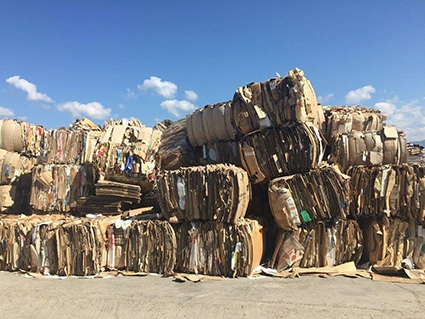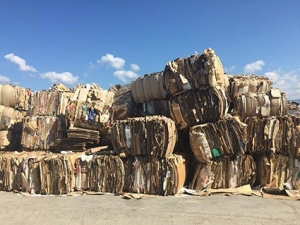Georgia Wastes Money with its Lack of Recycling Infrastructure
Producing energy, reducing pollution, saving money and manufacturing goods with less waste is essential for the development of the economy. With only about 20 household waste recycling companies, Georgia lacks the possibilities to reduce its waste, energy and lower greenhouse gas emissions. Recycling is a crucial factor of modern waste reduction and is the third component of the “Reduce, Reuse and Recycle” waste hierarchy.
All the waste that is put into Georgian landfills is a discarded resource, which could be practically reused, while we throw it away and use additional resources like land or import those goods that can be remade from waste. Rational use of such waste necessitates a building of a recycling sector so organized that it generates minimum waste.
The exact amount of Georgia’s annual household waste is unknown. However, according to the report conducted by the Ministry of Environment and Natural Resources in 2007, an estimated 800,000 tons of household waste is produced in Georgia. The report also noted that the annual household waste per capita ranges from 100 to 280 kg.
The recycling process includes separation, collection and recreation of waste products into new materials and helps expand the value of something already used via manufacturing something useable. Generally, batteries, biodegradable waste, glass, metal, paper and plastic are the most recyclable products.
Waste recycling infrastructure in Georgia is developing at a slow pace; so far, few companies have attained an Environmental Impact Permit and Georgia currently recycles paper, cardboard, glass, tire, cellophane and other goods but sees less benefit compared to other more developed countries. For instance, the Eurostat 2012 report notes that the top five most recycling countries of the EU are Germany, Austria, Belgium, Switzerland and Holland, who recycle most of their municipal waste.
According to Being wise with waste: the EU’s approach to waste management catalog published by the EU in 2010, the methane formed by a standard municipal landfill site, if transformed into energy, could offer electricity to about 20,000 households for a year. “It is estimated that the materials sent to landfills could have an annual commercial value of around €5.25 billion,” reads the report, adding that “The EU waste policy aims to ensure that waste is used wherever possible as raw material to make new products. Recycling also saves energy: recycling an aluminum can, for example, saves around 95% of the energy needed to make a new one from raw material.”
As the National Recycling Coalition, a non-profit organization in the USA states, paper recycling is a very profitable and environmentally friendly business as recycling one ton of paper saves 17 trees, 26,497 liters of water, 1,438 liters of oil, 2.5 cubic meters of landfill space and 4,000 kilowatts of energy, as well as reducing greenhouse gas emissions. Moreover, it creates jobs and, in Georgia’s case, could fight the 13.7% rate of unemployment.
Georgia currently has one paper collection company, one which recycles paper and one which manufactures cardboard boxes. Irakli Gvalia, the Director of LTD Georgian Recycling, a paper collecting point and a subcontractor of paper recycling company Kagaldi+ (Paper+), collects at least 2-3 thousand tons of paper from individuals, organizations and state institutions each month, which amounts to at least 4-5 thousand tons annually. “Each day we recycle 12 tons of paper to make primary and secondary cardboard. The company has the potential to recycle 20 tons daily, however, because of the unregulated market, we cannot,” explains Gvalia, adding that the company exports its goods to Armenia.
Unfortunately, his company does not yet comply with EU standards as it needs new equipment and an investment of around $700,000. Moreover, he believes that the government should encourage entrepreneurs to have more recycling companies, which will lead to lower prices. “Additionally, the state needs to put tax on imported materials and introduce market regulations,” he continued.
Mina, the only glass recycling company in Georgia, was created via Turkish investment and competes with Armenia, Azerbaijan and southern Russia. Inorganic substances are used to create glass bottles, while it also recycles the glass in order to manufacture new goods. According to Tamaz Tchintcharauli, the Marketing and Sales Director, the company exports its products to Azerbaijan, Turkey and Italy.
From the day of establishment the company has invested $60 million in its production. “At the moment, the difficult economic situation in the region determines the complex situation on the market - the demand has decreased. Therefore, we expect a financial loss due to the constant change of exchange rate for this and the upcoming year,” he explained.
Consistent with the EU Association Agreement, within six years Georgia should make steps towards EU standards in order to solve waste management problems like collection, disposal, recycling, as well as the closure of old landfills. And in order to fulfill those requirements, Georgia needs to allocate more funds from the state budget to waste management issues and attracting investors.
Prepared by USAID’S Waste Management Technologies in the Regions Project












